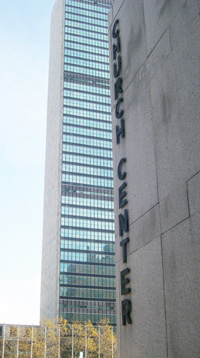Welcome to the WCC United Nations liaison office!
For over 50 years, the WCC has had an office in New York relating to the work of the United Nations.
Through the WCC, the ecumenical movement, has played an important role in many UN processes and actions, from the drafting of the UN Charter and the Universal Declaration of Human Rights to current issues of international peace and conflict, disarmament and sustainable development.
Since its foundation, the WCC has provided opportunities for people of faith around the world to participate in the deliberations and actions of the UN.
Our mission
The mission of the WCC UN Liaison Office (UNLO) is to monitor, analyze and provide information on UN processes as well as on international political trends, and provide a platform to our member churches for information-sharing and joint advocacy on, inter alia, human rights violations, global security, conflicts and sustainable development. Vital to our mission is to give voice to the ethical, moral and spiritual values that must underpin international relations, and to promote WCC standpoints and policies to UN bodies and member states.
Our objectives
The aim of the WCC UN Liaison Office is to serve as a link between the UN and the work and constituency of the WCC and to further ecumenical priorities in the UN. Fundamental to the work of the office is to give member churches access to relevant information on UN-related processes and international affairs, and provide representation in the international debate.
Our advocacy efforts aim at influencing specific political discourses and decision-making processes, with a particular focus on work with the Security Council in response to conflicts, disarmament and environment. Other prioritized areas are economic justice, impunity and Indigenous peoples. Further, the UN Liaison Office advises and assists in the formation of WCC policies on international affairs. |
CONNECTING THE WCC AND THE UN
Review of the 2005 UN World Summit,
by Katherine Nightingale
This briefing aims to outline the WCC-CCIA UN office’s analysis of the 2005 UN World Summit and particularly draws on the summit outcome document as the key indicator of what commitments were or were not achieved. |
 The UNLO office is housed in the Church Center which faces the UN headquarters
The UNLO office is housed in the Church Center which faces the UN headquarters
|
| This briefing includes analysis of the Summit’s outcome in these areas: Economic Justice and Poverty Eradication; Peace and Security; Human Rights and the Rule of Law; UN Institutional Reform; Environment; The Role of Religion and Culture; Churches and the Summit. Read more |
UN Reform Seminar, January, 2006
The UN Reform agenda includes four areas: the Security Council; creation of a Human Rights Council; a Peace-building Commission; and reform of the Secretariat. This UNLO-sponsored seminar will consider the UN Reform agenda and help the office draft a statement to present to the WCC 9th Assembly, Porto Alegre. More details
The UNLO will attend the Assembly of State Parties, 28 November - 3 December at the Hague.
The UNLO is active in the UN Preparatory Committee (January) for the UN Review Conference of Small Arms and Light Weapons.
|
The UNLO at the WCC's 9th Assembly: Public forum on “Children and armed conflict”
UNLO staff will serve as experts to the Public Issues Committee (PIC) about the UN agenda. The PIC will draft statements for the Assembly’s approval regarding water, UN reform, Latin America, terrorism, nuclear weapons, and the responsibility to protect.
9th Assembly website
|
 |
Manual for faith communities on justice and reconciliation through the International Criminal Court |
February - "The establishment of the International Criminal Court (ICC) is one of the most important steps forward in International Law in the last decades. The Court provides the international community with an instrument to defend human rights and pursue justice, for specified crimes that otherwise would be committed with impunity. The action of the ICC is an important step in the process of building reconciliation within and among nations and communities. "
Full statement on the ICC by the WCC central committee 2005 |
|
|











